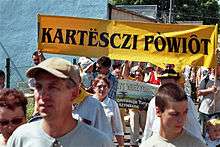Lechitic languages
| Lechitic | |
|---|---|
| Geographic distribution: | Poland |
| Linguistic classification: |
|
| Subdivisions: | |
| Glottolog: | lech1241[1] |
The Lechitic (or Lekhitic) languages are a language group consisting of Polish and several other languages that are or were spoken in areas of modern Poland and northeastern parts of modern Germany.[2] It is one of the branches of the larger West Slavic language family; the other branches of this family are the Czech–Slovak languages and the Sorbian languages.
Languages
The Book of Henryków, containing what is claimed to be the first written Polish sentence

Kashubian jamboree in Łeba in 2005 – banner showing the Kashubian name of Kartuzy County
The Lechitic languages are:
- Polish (ISO 639-1 code: pl, ISO 639-2 code: pol), used by approximately 38 million native speakers in Poland and several million elsewhere. Polish is considered to have several dialects, including Greater Polish, Lesser Polish and Masovian, among others.
- Kashubian (ISO 639-2 code: csb), used today by over 110,000 people (2011 census)[3] in the eastern part of Pomerania;
- Silesian (ISO 639-3 code: szl), used today by over 530,000 people (2011 census)[3] in Polish Silesia and by some more people in Czech Silesia.
- Slovincian, extinct since the early 20th century, a language formerly spoken in parts of Pomerania, sometimes identified with Kashubian as a single Pomeranian language (which may also be considered a dialect of Polish);
- Polabian (SIL code: pox), extinct since the mid 18th century, a language formerly spoken by Slavic peoples in areas around the Elbe river in what is now the northeast of Germany.
Features
Characteristics of Lechitic languages include:[4]
- Preservation of nasal vowels.
- Development of proto-Slavic ě, e, ę into a, o, ǫ before hard consonants (or other similar differentiations of these vowels depending on dialect). This gives rise to alternations such as modern Polish lato ("summer", nominative) vs. lecie (locative), pięć ("five") vs. piąty ("fifth").
- Vocalization of the syllabic consonants r, r', l', l. Compare modern Polish gardło ("throat") with Czech hrdlo.
- Transposition of or, ol, er, el into ro etc. in many words between consonants. Compare Polish mleko "milk".
- Retention of Proto-Slavic *dz as an affricate, rather than a plain fricative z.
- Lack of the g → ɣ transition. Compare Polish góra, Czech hora ("mountain").
- The so-called fourth palatalization of velars in Polish and Kashubian.
Etymology
The term Lechitic is applied both to the languages of this group and to Slavic peoples speaking these languages (known as Lechites). The term is related to the name of the legendary Polish forefather Lech and the name Lechia by which Poland was formerly sometimes known. For more details, see Lechites.
Notes
- ↑ Hammarström, Harald; Forkel, Robert; Haspelmath, Martin; Bank, Sebastian, eds. (2016). "Lechitic". Glottolog 2.7. Jena: Max Planck Institute for the Science of Human History.
- ↑ Lekhitic languages, Encyclopædia Britannica. Retrieved July 2008
- 1 2 Narodowy Spis Powszechny Ludności i Mieszkań 2011. Raport z wyników - Central Statistical Office of Poland
- ↑ Zenon Klemensiewicz, Historia języka polskiego, 7th edition, Wydawnictwo naukowe PWN, Warsaw 1999. ISBN 83-01-12760-0
See also
This article is issued from Wikipedia - version of the 12/24/2015. The text is available under the Creative Commons Attribution/Share Alike but additional terms may apply for the media files.